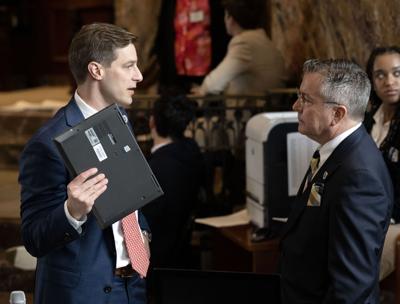A bloc of conservatives in the Louisiana House have sparred for weeks with more moderate Republicans and legislative leadership, vowing that at least 36 of them would hold the line and cut spending.
But Wednesday, their effort petered out in a series of failed votes on the House floor as the chamber voted overwhelmingly to lift a spending limit at the heart of a major political rift in the Legislature.
In the days before the vote, political pressure mounted on lawmakers to support raising the cap. The Senate and Gov. John Bel Edwards were aligned on a plan to spend an influx of money on things such as coastal restoration and infrastructure. In the end, just 19 of the original 36 conservative House members voted against that plan — well short of the votes needed to block the required two-thirds majority. All but one Democrat joined 52 Republicans in voting to lift the spending cap.
The vote closed the book on one of the biggest and most politically divisive issues of the session. Raising the cap will allow spending on Edwards’ and legislative leaders’ infrastructure priorities that the small number of House conservatives sought to stymie.
"This is a really tough vote in an election year," said state Rep. Brett Geymann, an architect of a House-approved budget package that stayed beneath the limit. Geymann — who made his name as one of the “fiscal hawks” who fought then-Gov. Bobby Jindal’s troubled budgets — voted to reject Senate Concurrent Resolution 3, the measure to raise the cap.
Lawmakers were working against the clock Wednesday to finalize major budget bills and a range of other legislation as the session's scheduled adjournment on Thursday evening drew closer.
The Legislature has until 6 p.m. Thursday to finalize House Bill 1, the main budget bill; House Bill 2, the state's construction budget; House Bill 560, the supplemental spending bill that allocates available portions of $2.2 billion in excess and surplus tax dollars; and a number of other bills dealing with both fiscal and non-fiscal matters. Lawmakers on Wednesday were hashing out those bills behind closed doors in conference committees, where legislative leaders will make changes, and potentially punish lawmakers who did not side with leadership.
Among those opposed to breaching the limit was Attorney General Jeff Landry, the frontrunner in this year’s governor’s race. He discussed his views with several conservative legislators but said he didn’t try to tell any of them how to vote.
Landry used an analogy to explain to members why they shouldn’t spend above the expenditure limit, he said.
“I said, ‘If you intend to come back to Baton Rouge as a legislator, and if you have to come back, whatever milk you spill today, you will have to clean up tomorrow,” Landry said in an interview.
In a statement, House Speaker Clay Schenxnayder said that raising the cap allows the state to plan for the future while still limiting bloat in government, as some lawmakers had advocated.
“The process of compromise can be difficult at times, but the vote by the members of the House represents the will of our constituents who want responsible investments, limited growth in government, and record savings in the bank,” he said.
House conservatives who wanted to leave the limit intact pushed to use the extra money to pay down hundreds of millions of state pension debt. This, they argued, would free up local dollars to give pay raises to teachers, a priority of Edwards and the Senate.
But Edwards and Senate President Page Cortez advocated instead for the extra tax dollars to pay for a slew of infrastructure priorities. They supported using ongoing state dollars to give teachers pay raises.
The vote on the spending limit appears to mark one of the first legislative defeats for the new Louisiana Freedom Caucus, an unofficial group modeled after a far-right caucus in the U.S. Congress that went public in April. The Louisiana chapter's public members are Reps. Alan Seabaugh, R-Shreveport; Larry Frieman, R-Abita Springs, and Beryl Amedée, R-Gray. Rep. Kathy Edmonston, R-Gonzales, has also said she is a member of the caucus.
All four voted against raising the spending cap. So did Rep. Blake Miguez, R-New Iberia, the House Republican Delegation chairman.
Geymann said he did not begrudge any of his colleagues their votes. Pressure from local officials, Edwards' office and elsewhere simply proved too strong to whip 36 votes, he said.
"If you’re a House member, you’re getting pressure from the Senate," Geymann said. "The governor’s office was engaged. There was pressure coming from everywhere."
Some conservatives who lobbied to stay beneath the cap took to wearing lapel pins bearing the number "36." In a jab at those lawmakers, a few state Senators on Wednesday pinned pieces of paper to their jackets on which they crossed out the number "36" and instead wrote "19.”
Staff writer Tyler Bridges contributed to this report.



